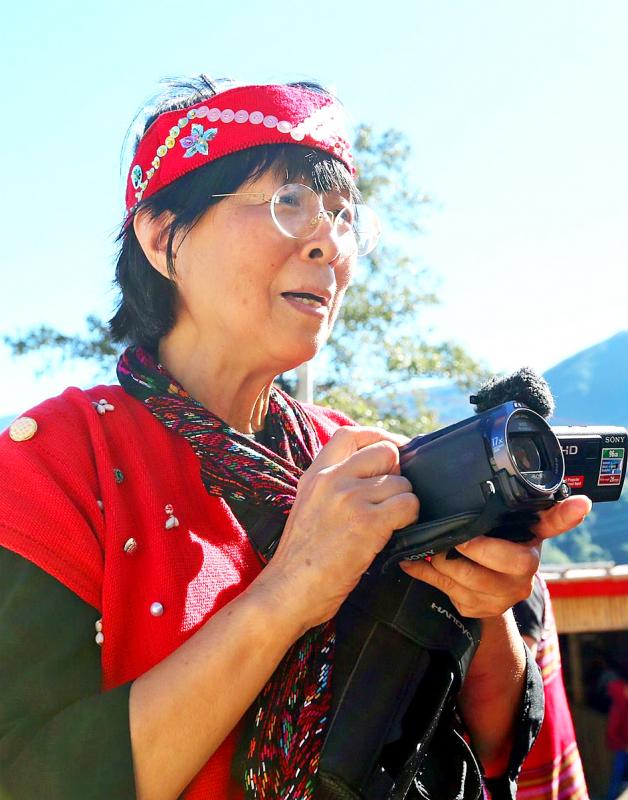Hu Tai-li (胡台麗), an anthropologist, ethnographic filmmaker and adjunct research fellow at Academia Sinica’s Institute of Ethnology, has died following an illness.
She was 72 years old, former Council of Indigenous Peoples minister Sun Ta-chuan (孫大川) said on Sunday.
Sun wrote on Facebook on Sunday morning that he was shocked and saddened to hear late on Saturday night of the passing of Hu, a well-respected friend of Indigenous peoples.

Photo courtesy of the Bureau of Cultural Heritage
Born in 1950, Hu, a pioneer of ethnographic films, graduated from National Taiwan University’s (NTU) department of history and obtained a doctorate in anthropology from City University of New York.
She concurrently served as a research fellow at Academia Sinica, a professor at National Tsing Hua University’s Institute of Anthropology, chairwoman of the Taiwan International Ethnographic Film Festival and head of the Taiwan Association of Visual Ethnography.
Hu directed and produced a number of documentaries, and published several books that inspired the study of Taiwan’s Indigenous communities, new immigrants and ethnic groups, and gender issues.
In 1984, Hu made her first ethnographic documentary titled The Return of Gods and Ancestors.
Her film Voices of Orchid Island won the Best Documentary Film award at the 1993 Taipei Golden Horse Film Festival and a Silver Plaque at the 1994 Chicago International Film Festival.
In 1997, her documentary Passing Through My Mother-in-law’s Village became the first one in Taiwan to be shown in commercial theaters.
Hu’s other films have received awards at several international film festivals: Returning Souls received a special mention in the Intangible Cultural Heritage category at the 2012 Jean Rouch International Film Festival in Paris, and a Gold Remi Award in the Ethnic and Cultural category at the 2013 WorldFest Houston in Texas.
Hu in 1986 published her first book, titled Sex and Death, which described her experiences in Papua New Guinea, where she conducted field research after earning her doctorate, but before returning to Taiwan.
“We often worry that the culture of Aboriginal tribes is on the verge of disappearing, but we don’t ask whether our own culture is about to disappear,” Hu wrote.
“If we are not willing to abandon our prejudices, and face our own and other ethnic cultures humbly, we will never escape the fate of being someone with a narrow view of the world, just like a frog in a well,” she wrote.
Her other writings include: Daughter-in-law Entering the Door; Mother-in-law’s Village: Rural Industrialization and Change in Taiwan; Burning Melancholy, Paiwan Nose and Mouth Flutes; and Cultural Performances and Taiwan Indigenous Peoples.
Taiwanese author Chen Fang-ming (陳芳明) wrote on Facebook that he and Hu were classmates at NTU.
Hu was known for being a serious and rigorous student, Chen said, adding that her death was “unacceptable.”
Choreographer Ping Heng (平珩), who did field work with Hu, wrote on Facebook that Hu introduced her to the world of ethnography.
Ping said she could never keep up with Hu’s vitality and her overflowing enthusiasm for doing anthropological fieldwork.

The brilliant blue waters, thick foliage and bucolic atmosphere on this seemingly idyllic archipelago deep in the Pacific Ocean belie the key role it now plays in a titanic geopolitical struggle. Palau is again on the front line as China, and the US and its allies prepare their forces in an intensifying contest for control over the Asia-Pacific region. The democratic nation of just 17,000 people hosts US-controlled airstrips and soon-to-be-completed radar installations that the US military describes as “critical” to monitoring vast swathes of water and airspace. It is also a key piece of the second island chain, a string of

A magnitude 5.9 earthquake that struck about 33km off the coast of Hualien City was the "main shock" in a series of quakes in the area, with aftershocks expected over the next three days, the Central Weather Administration (CWA) said yesterday. Prior to the magnitude 5.9 quake shaking most of Taiwan at 6:53pm yesterday, six other earthquakes stronger than a magnitude of 4, starting with a magnitude 5.5 quake at 6:09pm, occurred in the area. CWA Seismological Center Director Wu Chien-fu (吳健富) confirmed that the quakes were all part of the same series and that the magnitude 5.5 temblor was

Taiwan will now have four additional national holidays after the Legislative Yuan passed an amendment today, which also made Labor Day a national holiday for all sectors. The Chinese Nationalist Party (KMT) and Taiwan People’s Party (TPP) used their majority in the Legislative Yuan to pass the amendment to the Act on Implementing Memorial Days and State Holidays (紀念日及節日實施辦法), which the parties jointly proposed, in its third and final reading today. The legislature passed the bill to amend the act, which is currently enforced administratively, raising it to the legal level. The new legislation recognizes Confucius’ birthday on Sept. 28, the

The Central Weather Administration has issued a heat alert for southeastern Taiwan, warning of temperatures as high as 36°C today, while alerting some coastal areas of strong winds later in the day. Kaohsiung’s Neimen District (內門) and Pingtung County’s Neipu Township (內埔) are under an orange heat alert, which warns of temperatures as high as 36°C for three consecutive days, the CWA said, citing southwest winds. The heat would also extend to Tainan’s Nansi (楠西) and Yujing (玉井) districts, as well as Pingtung’s Gaoshu (高樹), Yanpu (鹽埔) and Majia (瑪家) townships, it said, forecasting highs of up to 36°C in those areas